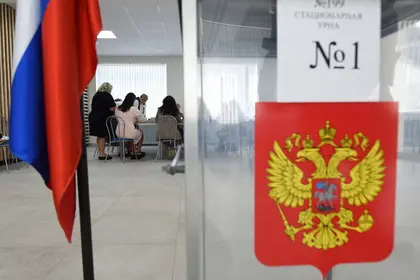Russia claimed Sunday, Sept. 10, that the United Russia party, which staunchly backs President Vladimir Putin, had won local ballots in four Ukrainian regions occupied by Russia.
The Kremlin claimed to have annexed the eastern and southern territories last year despite not having full military control over them. The elections have been dismissed by Ukraine and its allies as a sham.
JOIN US ON TELEGRAM
Follow our coverage of the war on the @Kyivpost_official.
Data published by Moscow and proxy officials showed voters in the war-battered territories, where Ukraine is clawing back ground, had backed United Russia with more than 70 percent of the ballot in each territory, state-run news agencies reported.
The polls also being held across Russia came ahead of presidential elections next year expected to prolong Putin's rule until at least 2030.
His opponents are in exile or jail and Moscow has criminalised criticism of its conflict in Ukraine and detained thousands for speaking out.
Authorities set up mobile polling booths days ahead of the vote in the regions of Donetsk, Lugansk, Kherson, and Zaporizhzhia, where Moscow said a polling station was attacked by a Ukrainian drone.
In Donetsk, which has been partially controlled by separatists since 2014, Kremlin-installed authorities said Ukrainian shelling had injured election officials.
Voting was also taking place in Crimea, annexed by Russia in 2014.
Ukrainian security services said they had compiled a list of "collaborators" helping to organise the voting and vowed retribution.

ISW Russian Offensive Campaign Assessment, January 21, 2025
- 'Live in peace' -
In Rostov-on-Don, a southwest city close to Ukraine's border attacked by drones this week, two voters told AFP the conflict was their main worry.
"We just want to live in peace with our children," said 40-year-old Nina Antonova.
"Everyone is worried about this one problem -- the war. We don't have any other concerns," said 84-year-old Anatoli, a pensioner who declined to give his last name.
In Moscow, which was also hosting a mayoral vote, there were few campaign posters.
Incumbant Sergei Sobyanin -- a Siberian-born Kremlin loyalist in post since 2010 -- won a "convincing" reelection, a senior election official said.
In his 13 years at the helm of Europe's largest city, Sobyanin has presided over numerous mega-projects that have transformed Moscow's skyline.
In 2013, he was almost defeated by anti-corruption campaigner Alexei Navalny.
Navalny, who dismissed the vote from behind bars, was jailed in 2020 on old fraud charges his allies say were a pretext to end his political work.
Sobyanin beat out the grandson of a veteran Communist politician and a little-known candidate from a new party dubbed "New People".
Moscow residents ahead of the vote had praised Sobyanin for modernising the city.
"Moscow is blossoming in front of our eyes," 21-year-old student Rukhin Aliyev told AFP.
Musician Kirill Lobanov said Sobyanin had done "very well" as mayor, particularly "in the last year" marked by the conflict.
Sobyanin has downplayed increasing Ukrainian drone attacks on Moscow that have hit the Kremlin and crashed into the capital's iconic financial district.
- 'High alert' -
In regions bordering Ukraine that have seen frequent attacks, voting was going ahead with additional security precautions.
Electoral commission chief Ella Pamfilova said voting had been postponed in Shebekino, a district of the Belgorod region that has been hit by shelling, "due to a regime of high alert".
Observers say one of the few competitive races in Russia's 11 time zones emerged in Siberia's remote Khakassia, where governor Valentin Konovalov is seeking re-election.
The 35-year-old Communist defeated a Kremlin-backed candidate in 2018 after a wave of rare protests in the sparsely populated mountainous region.
In this year's campaign, he initially faced Moscow-backed candidate Sergei Sokol, who portrayed himself as a Kremlin-decorated "hero" who fought in Ukraine.
Sokol dropped out at the last minute, citing health reasons. Konovalov is one of few regional leaders not backed by the Kremlin who remains in office.
You can also highlight the text and press Ctrl + Enter










